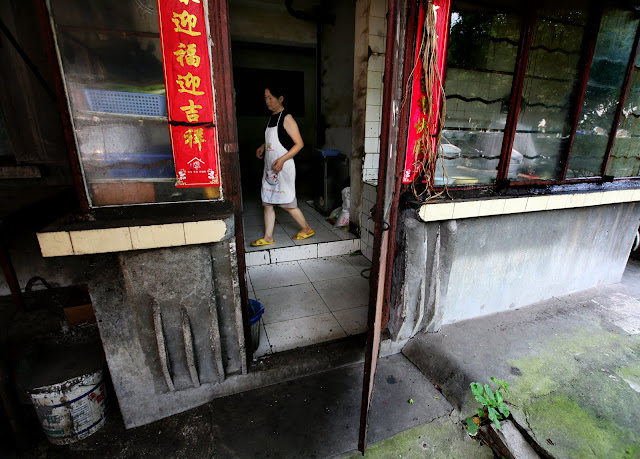If you focused on the name alone, mooncakes would be
fairytale sweets. They sound ephemeral and delicate and something like happily ever after.
They sound petite or perhaps enormous. Maybe lighter than air. It’s the kind of
name that makes you wonder what pastry miracle this cake might be. But for all
of the wondering, and extravagant imaginings, mooncakes are something else.
This year China celebrated the Mid-Autumn Festival(中秋节)on
September 12. This holiday is related to the autumn equinox and the rhythms
of agrarian life, and it occurs when the moon is at its fullest and brightest. Because
of the intricacies of the Lunar Calendar the date of the holiday changes annually,
but what never changes is that this is the day of the mooncake. They are meant
to be eaten with family as you appreciate the beauty of the moon, and they are an
integral part of the celebration.
The first thing to know about mooncakes is that they are not
cakes in the western sense. They are something small and singular and special,
and for newcomers like myself they elude a clear and concise description. This is because they can be many things. They can be sweet and they can be savory.
They can be soft and they can be firm. And most confusing, they can be all of
these things at once.
We had a small collection of mooncakes in our house so we
thought it only fitting to celebrate our first Mid-Autumn Festival with a
decidedly amateur, and hopefully educational, mooncake tasting.
(Mooncakes reviewed left to right)
Our favorite
It’s a rabbit! In honor of the Year of the Rabbit, Starbucks
produced this cuter than average variety. The Starbucks folks told me it’s
hazelnut flavor but we think it’s more like chocolate, coffee and caramel. The texture is like biting into a hunk of marzipan or really solid mashed potatoes.
Split personality
There’s an egg yolk at the center of this mooncake. It tastes salty and meaty but is coated with a sweet gel. It’s sort of like eating toast and jelly, and a hard-boiled egg all at the same time. I just wish it would choose a side.
Easiest to eat
The daintiness of this mooncake means that it’s not as intense, or
as much like a hockey puck, as some others. It has a delicate figgy sweetness.
Best for beginners
This lotus mooncake is sweet and a little mysterious, with hidden notes of honeydew. Nothing chewy. Nothing salty. Just a whole mess of sweet.
Least surprising
Starbucks says it's blueberry macadamia flavor. We
think it tastes like blueberry and coffee and caramelized sugar, and it has the
same texture from surface to center. It’s basically a soft chewable hockey
puck. The flavors are sweet and identifiable to the western palette but still
not as sweet as candy or birthday cake.
Still speechless
This mooncake has the consistency of Play-Doh and is bursting
with chewy dried meat. It smells like anice and is reminiscent of the aroma in Taiwanese
convenience stores. Bottom line: It’s pretty disconcerting to run into salty
meat strings when chewing through an otherwise sweet mass.
Let’s call it “just ok”
Could be lotus. Could be something else. It’s sweet with an odd tendril of an even sweeter musky flavor. If I didn’t know better I'd say there was a touch of circus peanut in there somewhere.
Leave it to the experts
There’s a really meaty egg yolk at the center that's been dried out and intensified. The texture is off-putting, at times hard
and dry, at other times flaky and chewy. It’s encased by that generically sweet
gel all mooncakes seem to have, but it continues to be meaty tasting at the same time.
Pretty intense.
Most flavor fighting
The inside is crunchy with grains, but the sweet gel and the
grains are duking it out. The grains want to taste like fields and farms,
but the gel stills wants to be cake and sweet. Lacking harmony.
Birthday worthy
My Chinese teacher spent a lot of time telling me how much
she loves ice cream mooncakes so we hunted down a place where they hadn't sold
out yet. This led us to Haagen Dazs and their exorbitantly expensive versions. The
verdict: They're not mooncakes, they’re ice cream coated in chocolate. And
they’re awesome – especially when your other options involve dried meat and egg
yolks.


















































